|
|
|
Sort Order |
|
|
|
Items / Page
|
|
|
|
|
|
|
| Srl | Item |
| 1 |
ID:
144255
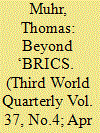

|
|
|
|
|
| Summary/Abstract |
Grounded in a review of past and present academic South–South cooperation literatures, this article advances ten theses that problematise empirical, theoretical, conceptual and methodological issues essential to discussions of South–South cooperation in the 21st century. This endeavour is motivated by the perceived undermining, especially in the contemporary Anglophone academic South–South cooperation literature, of the emancipatory potential historically associated with South–South cooperation. By drawing on the interventionist South–South cooperation agendas of ‘left’-leaning Latin America-Caribbean governments, the article seeks to establish a dialogue between social science theories and less ‘visible’ analyses from academic (semi)peripheries. The ten theses culminate in an exploration of the potential of South–South cooperation to promote ‘alternative’ development.
|
|
|
|
|
|
|
|
|
|
|
|
|
|
|
|
| 2 |
ID:
163077
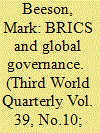

|
|
|
|
|
| Summary/Abstract |
The impact of rising powers generally and the BRICS - Brazil, Russia, India, China and South Africa - in particular on the existing global order has become controversial and contested. Donald Trump’s nationalist foreign policy agenda has raised questions about the BRICS willingness and capacity to provide leadership in place on an American administration that is increasingly inward looking. As a result, the rise of BRICS poses potential normative and structural challenges to the existing liberal international order. Given its geoeconomic significance, China also poses a potential problem for the other BRICS, as well as the governance of the existing order more generally. Consequently, we argue that it will be difficult for the BRICS to maintain a unified position amongst themselves, let alone play a constructive role in preserving the foundations of ‘global governance’.
|
|
|
|
|
|
|
|
|
|
|
|
|
|
|
|
| 3 |
ID:
144254
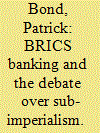

|
|
|
|
|
| Summary/Abstract |
Funded at $100 billion each, the BRICS Contingent Reserve Arrangement (CRA) and New Development Bank (NDB) represent ‘sub-imperial’ finance, insofar as, by all indications, they fit into – instead of providing alternatives to – the prevailing world systems of sovereign debt and project credits. Balance of payments constraints for BRICS members will not be relieved by the CRA, which requires an IMF intervention after just 30% of the quota is borrowed. In this context the NDB would appear close to the Bretton Woods Institution model, promoting frenetic extractivist calculations based on US dollar financing and hence more pressure to export.
|
|
|
|
|
|
|
|
|
|
|
|
|
|
|
|
| 4 |
ID:
167693
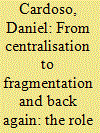

|
|
|
|
|
| Summary/Abstract |
Since the 1990s, Brazil’s foreign policy-making, traditionally a highly centralised and hierarchical process, has become more fragmented, plural and horizontal. In this context, the role of non-state actors has been increasingly relevant. The impact and significance of these actors have been however a matter of debate. While there are authors that consider that non-state actors play only a secondary role in the policy-making process, there are others that assert that these actors work alongside governmental actors and directly influence policy choices. Drawing on the concept of network governance, the paper proposes a different view from the two recurrent approaches in the literature mentioned above. It argues that the recent steps to transform Brazil’s state governance from hierarchy to horizontal networks have indeed expanded the room for the direct participation of non-state actors in the policy process. However, state authorities fought to adjust this tendency, in order to retain control over the decision-making process, by putting in place formal and informal coordinating mechanisms led by the Ministry of Foreign Relations and the Presidency. This suggests Brazil’s foreign policy was made in the shadow of hierarchy. The paper demonstrates the argument using the case of Brazil’s foreign policy towards China.
|
|
|
|
|
|
|
|
|
|
|
|
|
|
|
|
| 5 |
ID:
164821
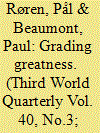

|
|
|
|
|
| Summary/Abstract |
An impressive portfolio of case-study research has now demonstrated how and through what means the BRICS (Brazil, Russia, India, China, South Africa) countries have sought higher social status. However, this field of research lacks systematic means of evaluating this status-seeking. This article fills this lacuna by developing a mixed-methods framework enabling scholars to zoom in and compare individual states’ relative status performance. Using diplomatic representation as a proxy for status recognition and comparing it to a country’s status resources (wealth), the framework indicates how successfully countries have generated recognition from the international society. The findings show that China’s economic ascent has been matched by increased recognition, and that South Africa enjoyed an almost immediate ‘status bounce’ following apartheid, turning it from a pariah to a significant overperformer. Russia should be understood as an ‘overperforming status-dissatisfied power’ while India’s status performance has been around ‘par’ for a country of its economic resources. Lastly, Brazil underperforms more than any of the other BRICS, especially since its democratic transition. The findings highlight considerable variance in the type and duration of gaps between status resource and recognition and suggests that rather than treating these as ‘inconsistencies’ awaiting correction, they can and should be accounted for by case study analyses.
|
|
|
|
|
|
|
|
|
|
|
|
|
|
|
|
| 6 |
ID:
163368
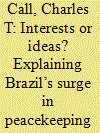

|
|
|
|
|
| Summary/Abstract |
Brazil is one of several rising powers that assumed greater protagonism in advancing peace on the global stage and in the Global South beginning in the early 2000s. In places like Haiti, East Timor, Guinea-Bissau, Angola and Mozambique, it expanded its peacekeeping deployments and exercised leadership on peacebuilding issues. What explains this notably increased activity on peace-related issues? In this article, I test four core theories of international relations – realism, liberalism, constructivism and post-colonial theory – to explain the rise and content of these policies in that country. Brazil has been vocal in its non-traditional approaches to peacekeeping and peacebuilding, and this study examines its rhetorical claims through theoretical lenses. It aspires to bring systematic theoretical thinking to a case whose empirics have been used to support each of the four main theoretical approaches. I argue that interest-based theories such as realism and liberalism best account for the emergence of Brazil’s increased peacekeeping and peacebuilding initiatives in the early 2000s. However, idea-based constructivist and post-colonial approaches are necessary to account for the content of these approaches that reflect national identity and social and culturally historic experiences.
|
|
|
|
|
|
|
|
|
|
|
|
|
|
|
|
| 7 |
ID:
144256
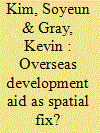

|
|
|
|
|
| Summary/Abstract |
This paper examines the extent to which South Korea’s developmental aid programme to Africa can be understood as a form of ‘aid as imperialism’. We argue against the depiction of a crude determinism between the ‘interests of capital’ and the international activism of the South Korean state through aid provision. Drawing on Harvey’s theory of the new imperialism, we argue that, while the structural transformations in the South Korean political economy explain Seoul’s ODA programme at a general level, it is strongly influenced by geopolitical objectives which often undermine South Korea’s ability to pursue distinctly mercantile aims.
|
|
|
|
|
|
|
|
|
|
|
|
|
|
|
|
| 8 |
ID:
144257
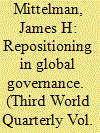

|
|
|
|
|
| Summary/Abstract |
This exploratory case study of repositioning focuses on changing relations among actors and the structures of global governance. It examines interactions between formal institutions, particularly the IMF, and informal networks of authority manifested in global forums, such as the G7/G8 and G20. The core argument is that global repositioning may be best understood in terms of increasing pliability in neoliberal globalisation. Pliable neoliberalism encompasses elasticity in practices and the stretching of spatial and institutional networks, plus pushback in the global North and South. It has two axes, one lateral and the other longitudinal. The former constitutes changes in global governance institutions; the latter turns on the resilience of neoliberalism and challenges to it. Horizontal shifts in global governance, as in changes in membership organisations, are made possible by verticality – hierarchies in social power relations. The evidence is drawn from documentary research and semi-structured discussions with global governance officials in Africa, Europe and North America.
|
|
|
|
|
|
|
|
|
|
|
|
|
|
|
|
| 9 |
ID:
158644


|
|
|
|
|
| Summary/Abstract |
A central theme of the literature on rising powers is that new aspirants to great power status pose a challenge to the underlying principles and norms that underpin the existing, Western-led order. However, in much of the literature, the nature and significance of rising powers for international order are imprecisely debated, in particular the concept and practice of ‘contestation’. In this article, we aim to establish a distinction between normative contestation and what can be thought of as ‘contestation over representation’: that is, contestation over who is setting and overseeing the rules of the game rather than the content of the rules themselves and the kind of order that they underpin. The paper engages with debates on international order and international society, and its empirical basis is provided by a thorough analysis of the discourse of rising power summitry.
|
|
|
|
|
|
|
|
|
|
|
|
|
|
|
|
|
|
|
|
|